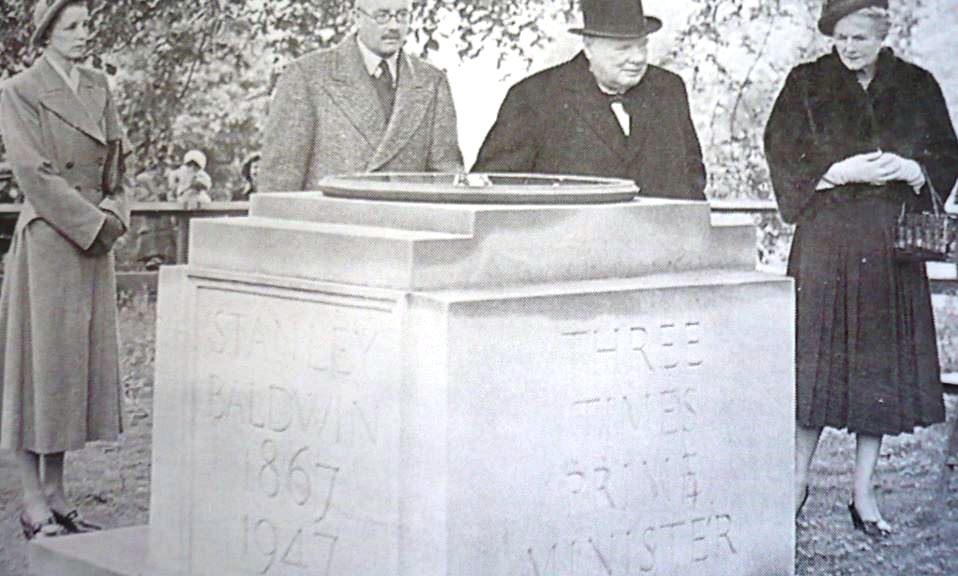
Churchill’s Magnanimity: Stanley Baldwin (1867-1947)
Churchill’s censorious remark about Prime Minister Stanley Baldwin was not, I was pleased to learn, his last words. Once again his characteristic magnanimity prevailed. My thanks to my colleague Dave Turrell for this information.
June, 1947
Sir Martin Gilbert published the arresting assertion by Churchill in 1947 (In Search of Churchill, 1995, 106). In June, WSC was invited to send a letter (I would think for a festschrift) on Baldwin’s 80th birthday, August 3rd. Writing to an intermediary, Churchill refused. “I wish Stanley Baldwin no ill, but it would have been much better if he had never lived.” Gilbert was taken aback:
In my long search for Churchill few letters have struck a clearer note than this one. Churchill was almost always magnanimous. His tribute to Neville Chamberlain in 1940 was among the high points of his parliamentary genius. But he saw Baldwin as responsible for the “locust years” when Britain, if differently led, could have easily rearmed, and kept well ahead of the German military and air expansion….
May, 1950
Dave Turrell was certain this wasn’t Churchill’s last word. He remembered that WSC had spoken at the dedication of a memorial three years after Baldwin’s death. Dave looked this up, and found that Churchill had ended the story with his more usual generosity. (From Robert Rhodes James, ed., Winston S. Churchill: His Complete Speeches, 8 vols., 1974, VIII: 8007-08):
…although I had several deep political differences with [Baldwin], we were always good friends, and I never remember a time when I could not discuss with him any matter, public or private, frankly and freely, as man to man. Here was a statesman who, over a long period of years, exercised a remarkable personal influence upon British politics and British fortunes…. In private life we must not forget how, after the First World War, he presented anonymously a fifth of his private fortune—£120,000—to the nation, seeking no thanks or political advantage.
[In 1924-29] he achieved two enduring triumphs. The first was the Pact of Locarno…the highest point reached in the peaceful settlement of Europe between the two world wars. The second was a five years’ steady improvement, judged by every test, in the standards of life, labour and employment of the British people….
Recounting their political arguments…
…Churchill continued kindly:
I had parted political companionship with him before he began his second long term of power. My difference arose about India. I hold to the views I then expressed today, but I am content to leave history to judge as it unfolds over the years that are to come. But the British nation, all parties in the State, have endorsed Mr. Baldwin’s views and the consequences that follow from them. No one who accepted his guidance then has a right to reproach his memory now….
A whole series of foreign and military events with which he was not specially fitted to deal then broke in upon his conduct of home affairs. As I was his chief critic upon these issues, and my words are upon record. I have a right to declare here and now, by this sandstone memorial, that his courage and patriotism did not fail, although the tragic course of events belied his judgement.
Perhaps a remnant of enmity survived when Churchill observed that the memorial was made of sandstone. Still, he added: “not all who now claim superior wisdom foresaw what was approaching.” Stanley Baldwin, he concluded, “was the most formidable politician I have ever known in our public life.”
“This sandstone memorial”

Dave mentioned finding the memorial in Astley, not far from the longtime Baldwin home. It was in “very sad and grubby condition, looking as if it had been knocked out of square by a passing lorry.” Happily in 2021 its trustees, the Astley and Dunley Parish Council, carefully restored the marker. It really is made of sandstone. An expert stonemason supervised its gentle cleaning. Today again, it meets Churchill’s expectations that day in 1950:
Of all parts of England, Worcestershire stood in his mind honoured and preeminent… The ground we now stand was his most sacred spot…. As the years roll by and the perspective of history lengthens and reduces so many of our disputes to their due proportion, there will be few who will pass this place without giving their respectful salute.







2 thoughts on “Churchill’s Magnanimity: Stanley Baldwin (1867-1947)”
The coal strike, which sparked the General Strike, carried on until the end of 1926, ending in defeat for the miners, a lot of bitterness and seriously damaged Churchill’s reputation on the Left. That the General Strike happened at all doesn’t say much for the case that the standard of living was improving. The magnanimity Churchill showed both Baldwin and Chamberlain was far more evident in public than in private. It is also less fair to blame Baldwin for the state of British preparedness, since WSC was his Chancellor of in 1924-29, slashing war budgets, blithely asserting that there was no chance of war with Japan in his lifetime. Whereas Chamberlain actually did loosen the pursestrings toward the end of his tenure, though nowhere near what was needed. Many thanks for this second go round. I also want to thank you for the advice you gave me some years ago on assembling a set of The World Crisis.
–
Indeed true about the strike damaging his reputation on the left. But prosperity is relative, and was better under Baldwin than in the early 1920s. So is rearmament. Times change, perspectives change. In the 1920s Japan was a WW1 ally and the Ten Year Rule prevailed. WSC did acknowledge Chamberlain’s rearmament, without which he couldn’t have won the Battle of Britain. Thanks for the kind words. —RML
“The second was a five years’ steady improvement, judged by every test, in the standards of life, labour and employment of the British people….”
Wonder what that General Strike in 1926, was about, then?
Also fitting to remember that Baldwin, after picking Churchill out of the political wilderness in 1924, by making Churchill Chancellor of the Exchequer, never gave Churchill any preferment in the next fifteen years. Neville Chamberlain didn’t promote Churchill either—until the war forced his hand in 1939. Easier to be magnanimous to someone who finally does promote you after fighting to keep you out, compared to someone who promoted you once, then successfully fought to keep you out for years.
–
Gregory, those are very valid points, though the General Strike was an anomaly in the five yeats 1925-29, and didn’t last a fortnight. And surely the point is that Churchill was magnanimous toward them both, though he did hold Baldwin more responsible for the state of defenses in 1939. -RML
Comments are closed.